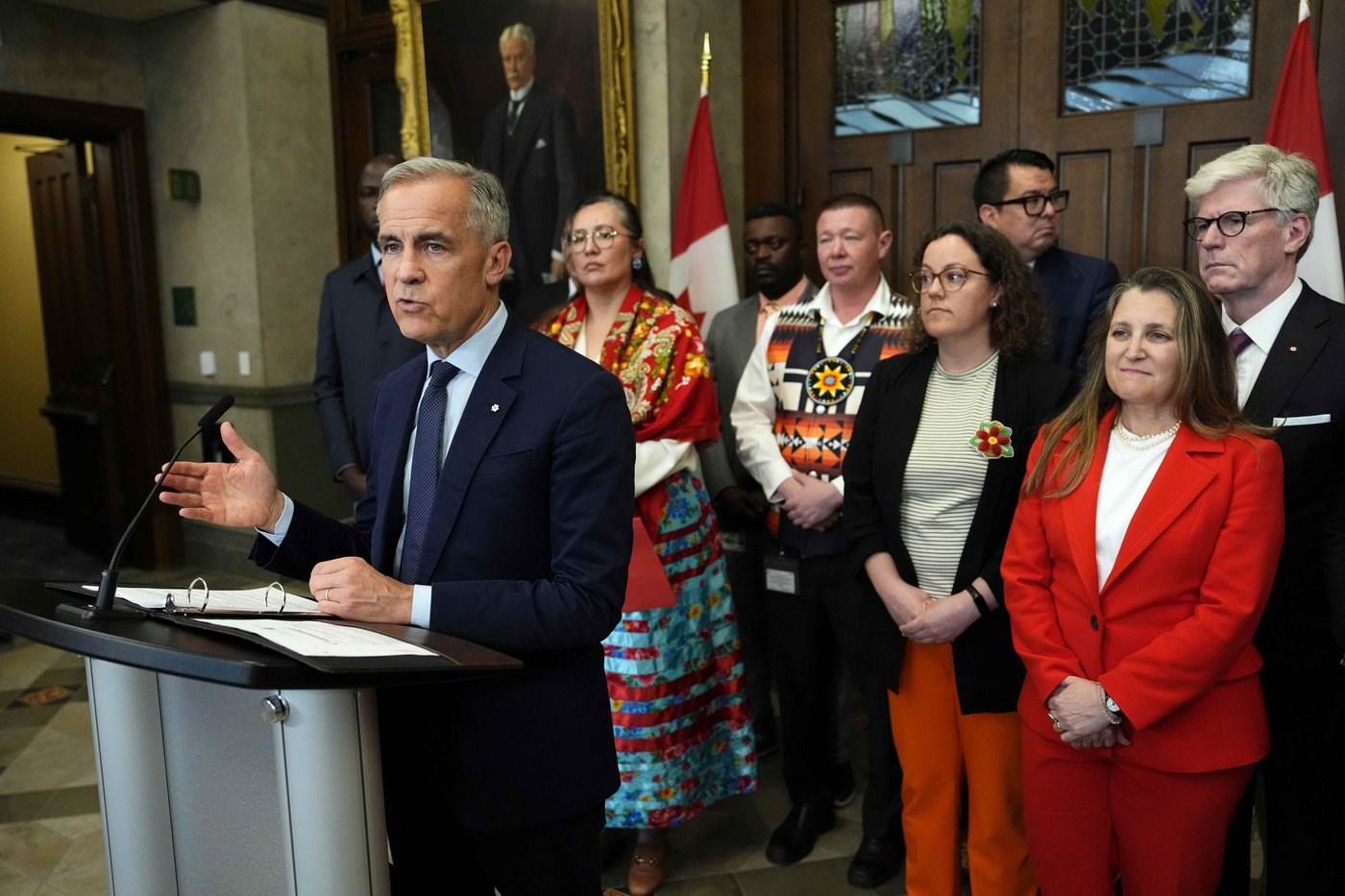
Prime Minister Mark Carney is joined by members of his cabinet and caucus as he speaks at a news conference in the Foyer of the House of Commons in Ottawa on Friday, June 20, 2025. THE CANADIAN PRESS/Justin Tang
Republished September 09, 2025 - 2:35 PM
Original Publication Date September 09, 2025 - 9:56 AM
OTTAWA — Prime Minister Mark Carney's decision to hold his first big caucus retreat in Edmonton this week is sending a signal to the country that he's taking direction from Canadians, rather than dictating terms from his downtown Ottawa office, a Liberal strategist says.
"The government is trying to send a signal that they are focused on the West, they are focused on energy and resource development and getting big projects done," said Ashley Csanady, a vice-president with McMillan Vantage.
It's the first time the caucus has met since June and the first caucus retreat held outside Ottawa since Carney took over the party's leadership last March.
"(They're) sticking a flag in the ground to say, 'We're in Edmonton, we're close to the oilpatch, we're not sitting in Central Canada humming and hawing over what natural resource and energy policy should look like. We're going to Western Canada and sitting down and thinking about this critically, (about) how we actually live up to some of the big promises we've made.'"
One of those big promises is to move ahead with major projects under fast-track legislation Carney's government passed swiftly in June, angering some Indigenous and environmental groups.
That legislation, C-5, allows cabinet to sidestep some existing laws and regulations to accelerate approvals for major projects the government deems to be in the national interest.
Carney has been vowing for weeks to unveil the initial short list of projects he wants to fast track using the bill, and has hinted in recent days about big announcements coming on ports and housing.
"Like anyone in Canada right now, it's really hard to have a conversation about politics or business and the economy and the effect of (U.S. President Donald) Trump and trade and tariffs to not be on the table," Csanady said.
"That has to be part of the conversation. But I think the thing that's really important to remember about caucus is it's also a chance for members to come back and tell cabinet what they have been hearing in their ridings all summer."
Csanady said domestic issues like the housing crisis, the state of health care and the cost of living are likely to be top of mind for Liberal MPs going into the meeting.
Other caucus members can be expected to bring up the government's lack of focus on the climate file as it pivots to the economy, or their concerns about the government's stance on rising antisemitism. More than 30 Liberal MPs recently issued a public statement calling for all Canadians to do more to combat anti-Jewish hatred.
"Everybody is entitled to their own opinion, and then the government largely comes forward with a position. Certainly what's driving the agenda for this government is the economy, trade, (and) world events," said Susan Smith, co-founder and principle at Bluesky Strategy Group and a Liberal commentator.
"It's not unusual that there might be a slight differing of opinions, but I think, as a whole, the government will be focused on doing what Canadians expect them to do."
The Liberals were elected on a promise to push back against Trump's tariffs and get the economy rolling. Carney presenting himself to voters as the right person for the job because of his experience leading through crises in his previous roles as the governor of the Bank of Canada and Bank of England.
Conservative Leader Pierre Poilievre has in recent weeks accused Carney of prioritizing toothless announcements over measures that might improve Canadians' lives.
With the House of Commons set to return next week, Smith said Poilievre will looking to clip Carney's wings.
"He's out of the penalty box," Smith said, referring to Poilievre winning an Alberta byelection this summer after losing his Ottawa-area seat in the spring election.
Carney has also promised to deliver a budget this fall after opting to not release one in the spring, as is typical, and could spend some of his time this week convincing his caucus the promised cuts to spending will be worth the short-term pain, while promising increased funding for things like national defence.
"We expect more to come, and we expect the caucus to be getting a bit of a briefing on what the big planks are in the budget (are) that they're going to then be expected to go sell to their constituents," said Csanady.
"It's always easier to spend money than save money, whether you're a government cutting its budget or a household."
This report by The Canadian Press was first published Sept. 9, 2025.
News from © The Canadian Press, 2025